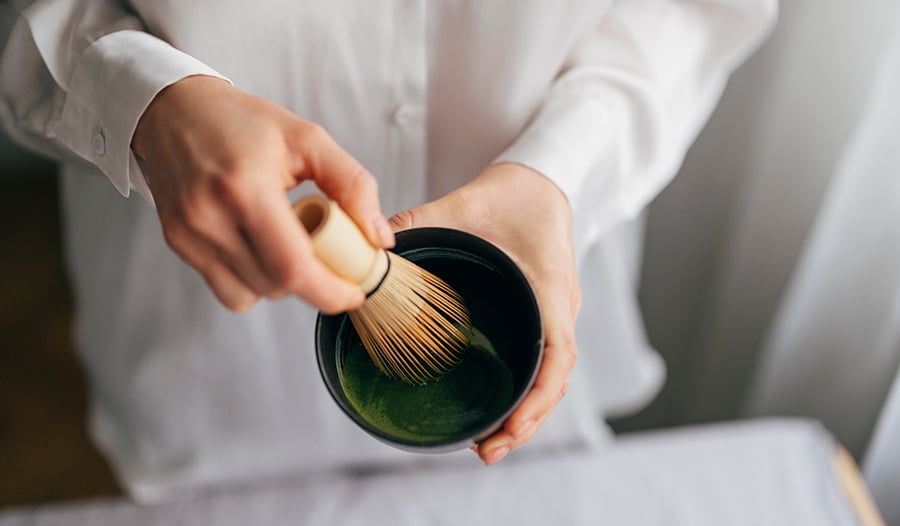Explore the Incredible Health Benefits of Matcha: The Japanese Superfood

Matcha, a powdered form of green tea, is a popular choice for hot and cold beverages at trending coffee and tea shops around the globe. The origins of matcha can be traced back to the Tang Dynasty during the 8th century in China. Making powdered tea from steam-prepared dried tea leaves became common in the 12th century. In 1191, Zen monk Myoan Eisai discovered matcha and brought the seeds to Japan, where he is said to have planted them in the garden of the Buddhist temple in Kyoto.
While matcha comes from the same plant as green tea, it is grown differently to maximize certain phytochemicals found within the tea leaves. The tea plant is covered approximately 25 days before harvest. This process leads to increased amino acid and chlorophyll production.
Made by grinding the leaves of the Camellia sinensis plant into a fine powder, matcha has gained popularity in recent years due to its numerous health benefits.
Let’s explore the top six health benefits of matcha.
1. Matcha Has Powerful Antioxidants
Antioxidants help protect the body from free radicals, which can cause cellular damage due to their unstable molecular formation. Matcha is rich in antioxidants, including catechins and epicatechins, both known for their anti-inflammatory properties.
Because matcha powder has all of the nutrients from the entire tea leaf, unlike traditionally steeping green tea leaves, it has more catechins and other antioxidants when added to hot water. One study found that matcha had as much as 137 times as many catechins as traditional green tea made from steeping the leaves.
Antioxidants are also powerful tools to help reduce the risk of chronic illnesses. Adding matcha to your diet could help prevent cellular damage by increasing your antioxidant levels. Studies show that a higher intake of antioxidant-rich foods, including matcha, is associated with a lower risk of chronic oxidative stress-related diseases, such as cardiovascular diseases, and deaths from all causes.
2. Matcha May Help You Manage Healthy Weight
Matcha may help boost your metabolism and increase fat-burning abilities, which could lead to weight loss. The combination of caffeine and the amino acid L-theanine found in matcha can help increase energy levels while also promoting relaxation and reducing stress. This can lead to improved physical performance and a reduction in body fat percentage.
A study found that drinking green tea extract during moderate levels of exercise increased fat burning by 17%. Another study found taking green tea supplements significantly increased 24-hour energy expenditure. Yet another study showed green tea consumption decreased body weight and helped maintain weight loss.
Including matcha in a balanced diet could help you manage a healthy weight while increasing your metabolism and energy levels.
3. Matcha May Have Anti-Aging Properties
The antioxidants found in matcha can help improve skin health and reduce the appearance of fine lines and wrinkles. These antioxidants can also help protect the skin from UV rays and pollution contributing to skin aging.
Antioxidants in matcha help protect skin cells against the damaging effects of reactive oxygen species (ROS), which are known to increase the signs of aging, inflammation, and photodamage due to the increase of oxidative stress. In addition, the antioxidants in matcha can help promote cell renewal and collagen production in the skin, helping it keep its youthful appearance with powerful anti-aging effects.
Regularly enjoying a cup of matcha may help you look younger by promoting cell renewal and collagen production while protecting your skin from UV rays, pollution, inflammation, and oxidative stress.
4. Matcha May Protect Your Liver
The liver is a vital organ that plays a key role in removing toxins from the body, processing nutrients, and more than 500 hundred other functions. Matcha may help your liver function.
One study gave 80 participants with nonalcoholic fatty liver disease 500 mg of green tea extract daily, while others received a placebo for 90 days. Liver enzyme levels were significantly decreased in the population taking the green tea extract compared to the placebo group. Elevated liver enzyme levels are indicative of liver damage.
Another study found that after 16 weeks, diabetic rats taking matcha had protection from both liver and kidney damage normally associated with diabetes. A final study found that those who drink green tea have a decreased risk of liver disease.
Incorporating matcha into your daily routine may help protect your liver, a vital organ you cannot live without.
5. Matcha May Have Positive Effects Heart Health
The catechins found in matcha could help improve blood flow and lower cholesterol levels. Both LDL, or bad, cholesterol levels and total cholesterol, along with triglycerides have been shown to decrease with green tea consumption.
Other studies show that green tea intake is related to decreased risk of heart disease and stroke. Compounds found in matcha can help break down plaques that may cause blockages in the heart’s coronary arteries. Matcha is also rich in polyphenols. These antioxidants are linked to lower blood pressure and better heart health.
Considering heart disease is the leading cause of death worldwide, adding matcha as a regular source or heart-protective micronutrients could be a good start to improving your heart health.
6. Matcha May Help Your Brain Perform Better
Various studies have found that the components of matcha, including caffeine and L-theanine, can help give the brain a boost.
One study found that consuming 2 grams of matcha powder daily for two months helped elderly people improve their brain function. Matcha has about 35 mg of caffeine per gram, which is about half a teaspoon of matcha powder. Several studies have shown that caffeine has positive effects on brain function, including faster reaction time, enhanced memory, and increased attention.
The compound L-theanine found in matcha acts synergistically with caffeine, helping to prevent the energy crash that oftentimes is accompanied by caffeine consumption. L-theanine also promotes alertness and has been shown to increase alpha-wave activity in the brain. Alpha waves may promote relaxation by reducing stress levels, which would have positive effects on brain function.
Another study found matcha improves memory, attention, and reaction time compared to placebo. Give your brain a boost by upping your matcha intake today.
Before You Begin a Matcha Routine
While matcha has several health benefits, there are a few precautions to be aware of before you make matcha a part of your daily routine.
Matcha is high in caffeine. Although caffeine has great benefits, such as increased energy and alertness, those who are sensitive to caffeine may find it too stimulating. Caffeine sensitivity may feel like having the jitters, feeling anxious, or not being able to fall asleep.
Those sensitive to caffeine can still consume matcha but may want to have it in moderation or at lower doses. Matcha can temporarily increase stomach acid immediately after consumption. This could cause a feeling of queasiness or upset stomach.
Due to the high caffeine content, diarrhea could also be a possible adverse effect if one consumes too much matcha.
Some liver toxicity has been shown in individuals who consume extremely high matcha daily. Remember, with matcha, less is more.
Keeping matcha tea consumption to one or two cups daily should eliminate most negative side effects.
The Big Picture
The numerous health benefits of matcha have made this green tea powder golden.
With its high antioxidant content, matcha may help reduce the risk of chronic illness. From heart to liver disease, matcha has proven itself in study after study to be protective while offering decreased risk.
These same antioxidants give matcha anti-aging power while providing a more youthful appearance to the skin. In addition, matcha may help restore liver damage and improve brain function for both young and seasoned alike.
Not many supplements can say they can help you lose weight, protect your heart, and decrease inflammation all at the same time.
Matcha is easy to prepare and can be taken in many different ways. You can add it to hot or cold water for a tasty tea or to baked goods for a healthy spin on your favorite dessert. A matcha smoothie is not a bad idea, or you can even try match pudding.
Welcome to the world of matcha! Begin enjoying its many health benefits today!
References:
- Arab L, Liu W, Elashoff D. Green and black tea consumption and risk of stroke: a meta-analysis. Stroke. 2009;40(5):1786-1792. doi:10.1161/STROKEAHA.108.538470
- Arts IC, Hollman PC, Feskens EJ, Bueno de Mesquita HB, Kromhout D. Catechin intake might explain the inverse relation between tea consumption and ischemic heart disease: the Zutphen Elderly Study. Am J Clin Nutr. 2001;74(2):227-232. doi:10.1093/ajcn/74.2.227
- Bérubé-Parent S, Pelletier C, Doré J, Tremblay A. Effects of encapsulated green tea and Guarana extracts containing a mixture of epigallocatechin-3-gallate and caffeine on 24 h energy expenditure and fat oxidation in men. Br J Nutr. 2005;94(3):432-436. doi:10.1079/bjn20051502
- Hursel R, Viechtbauer W, Westerterp-Plantenga MS. The effects of green tea on weight loss and weight maintenance: a meta-analysis. Int J Obes (Lond). 2009;33(9):956-961. doi:10.1038/ijo.2009.135
- Ide K, Yamada H, Takuma N, et al. Green tea consumption affects cognitive dysfunction in the elderly: a pilot study. Nutrients. 2014;6(10):4032-4042. Published 2014 Sep 29. doi:10.3390/nu6104032
- Jimenez-Saenz M, Martinez-Sanchez Mdel C. Acute hepatitis associated with the use of green tea infusions. J Hepatol. 2006;44(3):616-617. doi:10.1016/j.jhep.2005.11.041
- Michalak M. Plant-Derived Antioxidants: Significance in Skin Health and the Ageing Process. Int J Mol Sci. 2022;23(2):585. Published 2022 Jan 6. doi:10.3390/ijms23020585
- Nobre AC, Rao A, Owen GN. L-theanine, a natural constituent in tea, and its effect on mental state. Asia Pac J Clin Nutr. 2008;17 Suppl 1:167-168.
- Oresajo C, Pillai S, Manco M, Yatskayer M, McDaniel D. Antioxidants and the skin: understanding formulation and efficacy. Dermatol Ther. 2012;25(3):252-259. doi:10.1111/j.1529-8019.2012.01505.x
- Pezeshki A, Safi S, Feizi A, Askari G, Karami F. The effect of green tea extract supplementation on liver enzymes in patients with nonalcoholic fatty liver disease. Int J Prev Med. 2016;7:28. Published 2016 Feb 1. doi:10.4103/2008-7802.173051
- Pham-Huy LA, He H, Pham-Huy C. Free radicals, antioxidants in disease and health. Int J Biomed Sci. 2008;4(2):89-96.
- Sherman SM, Buckley TP, Baena E, Ryan L. Caffeine enhances memory performance in young adults during their non-optimal time of day. Front Psychol. 2016;7:1764. Published 2016 Nov 14. doi:10.3389/fpsyg.2016.01764
- Venables MC, Hulston CJ, Cox HR, Jeukendrup AE. Green tea extract ingestion, fat oxidation, and glucose tolerance in healthy humans. Am J Clin Nutr. 2008;87(3):778-784. doi:10.1093/ajcn/87.3.778
- Weiss DJ, Anderton CR. Determination of catechins in matcha green tea by micellar electrokinetic chromatography. J Chromatogr A. 2003;1011(1-2):173-180. doi:10.1016/s0021-9673(03)01133-6
- Yin X, Yang J, Li T, et al. The effect of green tea intake on risk of liver disease: a meta analysis. Int J Clin Exp Med. 2015;8(6):8339-8346. Published 2015 Jun 15.
- Zheng XX, Xu YL, Li SH, Liu XX, Hui R, Huang XH. Green tea intake lowers fasting serum total and LDL cholesterol in adults: a meta-analysis of 14 randomized controlled trials. Am J Clin Nutr. 2011;94(2):601-610. doi:10.3945/ajcn.110.010926
DISCLAIMER:This Wellness Hub does not intend to provide diagnosis...
















































































 Table of Contents
Table of Contents
















